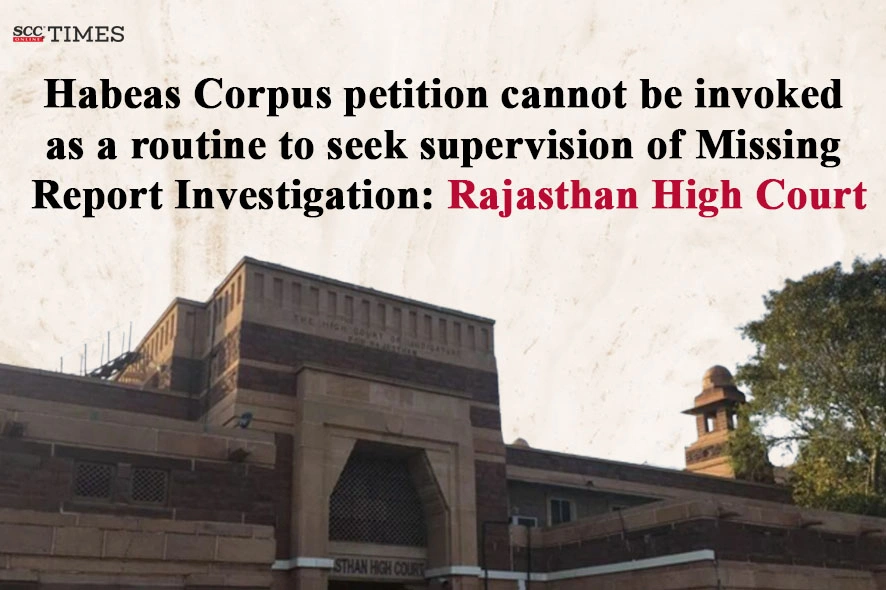Rajasthan High Court: In a Habeas Corpus petition filed by the petitioner seeking directions to produce her brother, a missing CRPF Constable, a Division Bench of Avneesh Jhingan* and Baljinder Singh Sandhu, JJ., dismissed the petition. The Court held that a petition in the nature of Habeas Corpus does not lie where there is no illegal detention, and the sole purpose is to seek supervision of the investigation of a Missing Person Report (‘MPR’). The Court clarified that the unlawful detention is the sine qua non for issuance of the writ, and the grievance against the manner of investigation is a matter for the concerned Magistrate under the provisions of the Code of Criminal Procedure, 1973 (‘CrPC’).
Background
The petitioner’s brother (‘corpus’) is a Constable in the CRPF, who proceeded on leave to his native place on 02-03-2025. He subsequently got his medical leave extended, and on 09-04-2025, he left his native place for joining his duties but failed to report. A MPR was submitted by the petitioner on 11-04-2025 but no effective steps were being taken on the MPR. Aggrieved, the petitioner filed present Habeas Corpus petition seeking directions to produce the corpus.
Analysis and Decision
The Court noted that a status report was filed by the Government Advocate-cum-Additional Advocate General on 23-09-2025, which stated that the CRPF Authorities had declared the corpus an absconder and issued arrest warrants and was wanted by the CRPF authorities and had been located moving around freely various places. From the status report, pleadings in the petition, and submissions made, the Court observed that it was forthcoming that there is no illegal detention of the corpus.
The Court noted that the issue was whether a petition in the nature of Habeas Corpus lies where there is no illegal detention, and the sole purpose is to seek supervision of the investigation of an MPR. The Court also noted that the unlawful detention is the sine qua non for issuance of writ of habeas corpus.
The Court noted that in Kanu Sanyal v. Distt. Magistrate, (1973) 2 SCC 674, the Supreme Court had held that the writ can be issued where there is a prima facie case of illegal detention, whether by the State or by a private party. The core purpose is the immediate determination of the right to the applicant’s freedom.
Further, in State v. H. Nilofer Nisha, (2020) 14 SCC 161, it was reiterated that the writ of habeas corpus is a processual writ available for enforcement of a fundamental right under Part III of the Constitution, but it will not lie where the detention or imprisonment is in accordance with the decision rendered by a court of law or an authority acting in accordance with law.
The Court also noted that in Union of India v. Yumnam Anand M., (2007) 10 SCC 190, it was held that the applicant must show a prima facie case of his unlawful detention, as the writ is a device to examine the question of illegal detention with the utmost promptitude.
The Court observed that in the case at hand, there was neither a pleading nor an allegation of illegal detention. The present case was one where the grievance was against the manner of investigation of the MPR.
The Court noted that the Supreme Court in Sakiri Vasu v. State of U.P., (2008) 2 SCC 409, had held that the power to supervise the investigation lies with the Magistrate. The proper recourse for an aggrieved person is to approach the Superintendent of Police under Section 154(3) CrPC and if that does not yield a satisfactory result, to file an application under Section 156(3) CrPC before the Magistrate concerned.
The Court observed that,
“The writ of Habeas Corpus is to secure release of person illegally detained either by State or a private individual. A prima facie case of illegal detention has to be made out for invoking the writ of Habeas Corpus. The scope of Habeas Corpus has been enlarged with time, but there cannot be a straitjacket formula for interference in writ in the nature of Habeas Corpus. It is a trite law that in ordinary course the high court should not interfere in writ jurisdiction, if there is an alternative remedy available. The writ jurisdiction in the case of a missing person cannot be invoked as a matter of routine to know the status of the investigation or on being dissatisfied with the manner of investigation. Criminal procedure law provided remedies for supervision of investigation and if required, for issuance of directions for effective investigation and such matters are to be dealt with by the competent court of law.”
Since no case was made out for invoking the writ jurisdiction, the Court dismissed the petition.
[Babita v. State of Rajasthan, 2025 SCC OnLine Raj 5227, decided on 24-09-2025]
Advocates who appeared in this case:
For Petitioner(s): Arun Sharma, Advocate
For Respondent(s): Rajesh Choudhary, GA-cum-AAG and Manvendra Singh Shekhawat, Dy. GA



